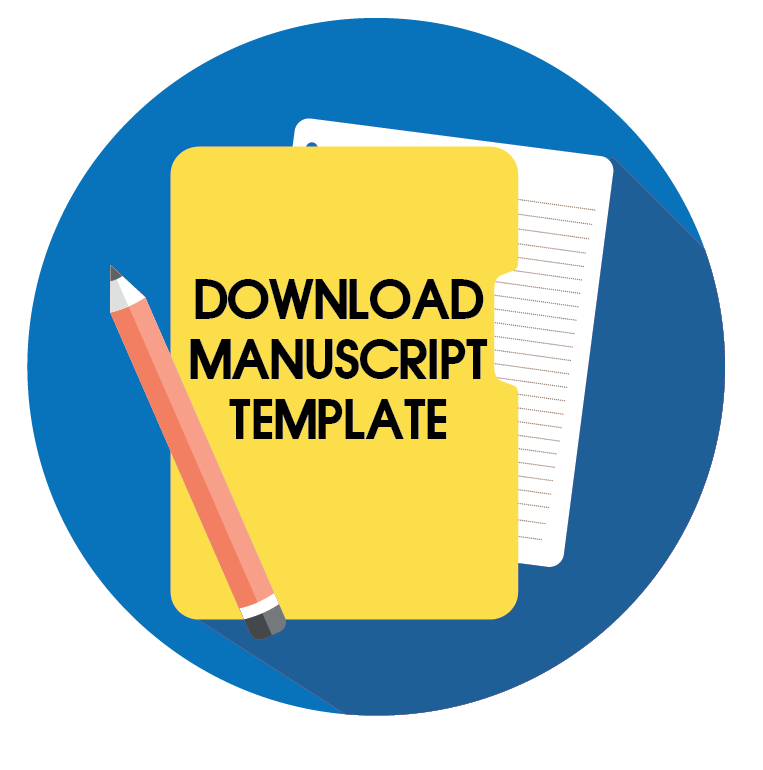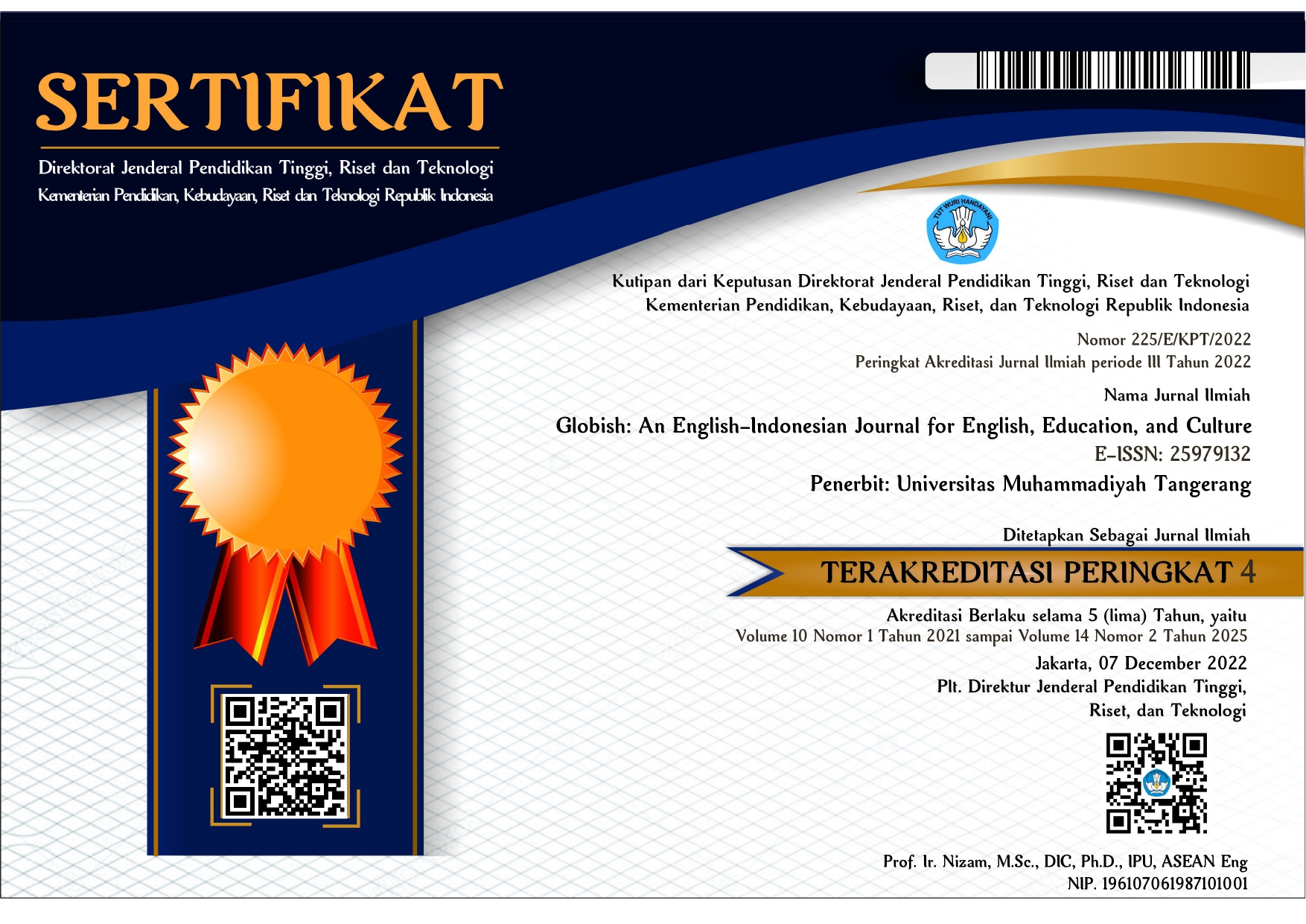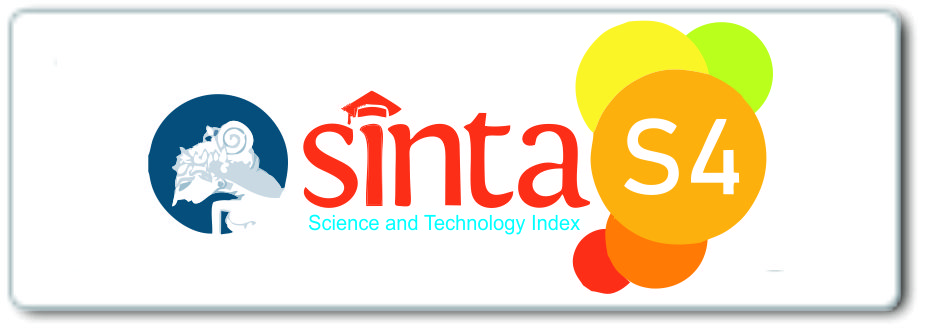The Use of Kahoot Application as a Learning Media to Improve Students' Vocabulary Mastery in Seventh Grade SMP Negeri 1 Ciomas
Abstract
The use of technology in education has become an integral component. This study aimed to investigate the effectiveness of the Kahoot application as a learning medium for seventh-grade students at SMPN 1 Ciomas in the academic year 2023/2024. The study employed a qualitative-quantitative approach through Collaborative-Classroom Action Research conducted in two cycles. The research sample consisted of 27 students from class VII E. Data were collected through participatory observation, pre-tests, post-tests, and closed questionnaires. Data analysis results indicated pre-test and post-test values at a significance level of 5% with degrees of freedom of 26 and a t-table value of 2.056, where the t-value for Cycle I was higher than the t-table (6.421 > 2.056) and for Cycle II was also higher than the t-table (9.593 > 2.056). Observations showed a significant increase in student participation levels, shifting from "Fair" in Cycle I to "Very Good" in Cycle II. Questionnaire responses were highly positive, with an average score of 82.24%, indicating student satisfaction and engagement with the Kahoot application. Overall, this study concludes that the Kahoot application could be used as an alternative learning medium or tool to enhance students' vocabulary at SMPN 1 Ciomas.
Keywords: Kahoot Application, Vocabulary Mastery, Action Research
Full Text:
PDFReferences
REFERENCES
Alqahtani, M. (2015). The importance of vocabulary in language learning and how to be taught. International Journal of Teaching and Education, III(3), 21–34. https://doi.org/10.20472/te.2015.3.3.002
Bicen, H., & Kocakoyun, S. (2018). Perceptions of students for gamification approach: Kahoot as a case study. International Journal of Emerging Technologies in Learning, 13(2), 72–93. https://doi.org/10.3991/ijet.v13i02.7467
Brown, D. (2003). Language Assessment: Principles and Classroom Practice. longman.com
Chen, Licorish, S. A., George, J. L., Owen, H. E., & Daniel, B. (2017). “Go kahoot!” Enriching classroom engagement, motivation and learning experience with games. Proceedings of the 25th International Conference on Computers in Education, ICCE 2017 - Main Conference Proceedings.
Dellos, R., Olesova, L., & Johnston, J. (2015). Effectiveness of Audio Feedback in Distance Education. Innovations in Teaching & Learning Conference Proceedings, 12, 49–52. https://doi.org/10.13021/g8060p
Hatch, E. M., & Brown, C. (1995). Vocabulary, semantics, and language education. In Cambridge language teaching library (pp. xii, 468).
Ismail, M. E., Irwan Mahazir, I., Othman, H., Amiruddin, M. H., & Ariffin, A. (2017). The use of animation video in teaching to enhance the imagination and visualization of student in engineering drawing. IOP Conference Series: Materials Science and Engineering, 203(1). https://doi.org/10.1088/1757-899X/203/1/012023
Johns, K. (2015). Engaging and Assessing Students with Technology: A Review of Kahoot! The Delta Kappa Gamma Bulletin, 89–91. https://doi.org/10.1007/s11251-006-9005-2
Kemmis, S., McTaggart, R., & Nixon, R. (2014). Action Research Planner Book. In Springer Science+Bussiness Media Singapore.
Latif, M. H., & Afzal, H. (2016). Prediction of Movies popularity Using Machine Learning Techniques. IJCSNS International Journal of Computer Science and Network Security, 16(8), 127.
Lehr, F., Osborn, J., & Hiebert, E. H. (2003). Research-Based Practices in Early Reading Series: A focus on vocabulary. 808.
Lisnani*, L., & Emmanuel, G. (2020). Analisis Penggunaan Aplikasi Kahoot dalam Pembelajaran IPA. Jurnal IPA & Pembelajaran IPA, 4(2), 155–167. https://doi.org/10.24815/jipi.v4i2.16018
Masykur, S. (2016). Manipulations Depicted In Orphan Movie.
Nabila, H., Al-Manar, M. A., & Gunawan, Y. I. (2023). The Effectiveness of Socrative Application for Formative Assessment on the Eighth Grade Students in Teaching Vocabulary At Smpn 16 Kota Tangerang Selatan. Globish: An English-Indonesian Journal for English, Education, and Culture, 12(2), 102. https://doi.org/10.31000/globish.v12i2.7846
Nagy, W. E., & Scott, J. A. (2008). More Than merely words: Redefining Vocabulary Learning in a Culturally and Linguistically Diverse Society. In Vine Project by IES Reading and Writing Education Research Grant Program.
Neuman, S. B., & Dwyer, J. (2009). Missing in Action: Vocabulary Instruction in Pre-K. The Reading Teacher, 62(5). https://doi.org/10.1598/rt.62.5.2
Noval, M., Nargis, & Putra, A. S. (2022). The Challenges of English Teachers in Teaching Online English By Using Edulearning Application At Smp Muhammadiyah 4. Globish: An English-Indonesian Journal for English, Education, and Culture, 11(1), 30. https://doi.org/10.31000/globish.v11i1.5664
Nurdyansyah. (2019). Media Pembelajaran Inovatif. In P. Rais (Ed.), UMSIDA Press. UMSIDA Press.
Prasetiyo, A. (2022). The Effectiveness of Kahoot! Game as Media on Students English Achievement at SMA 3 Ponorogo. etheses.iainponorogo.ac.id
Rachmawati, U. (2018). Reading Interest of Senior High School Students: a Case Study. Journal of Languages and Language Teaching, 6(1), 17. https://doi.org/10.33394/jollt.v6i1.809
Richards, J. C., & Renandya, W. A. (2002). Review: Methodology in Language Teaching: an Anthology of Current Practice. Per Linguam, 18(2), 55–57. https://doi.org/10.5785/18-2-130
Rizky, F. M. (2022). The Use Kahoot! Game on Students Vocabulary Knowledge. respository.uinjkt.ac.id
Soliha, N. K., & Rohim, A. (2021). The Effect of Boggle Games on the Vocabulary Mastery of the Seventh Grade Students’ At Mts. Nurul Hikmah. Globish: An English-Indonesian Journal for English, Education, and Culture, 10(1), 18. https://doi.org/10.31000/globish.v10i1.3872
Thornbury, S. (2002). How to Teach Vocabulary.
Zaitun, Hadi, M. S., & Indriani, E. D. (2021). TikTok as a Media to Enhancing the Speaking Skills of EFL Student ’ s. Jurnal Studi Guru Dan Pembelajaran, 4(1), 4(1), 89–94.
DOI: http://dx.doi.org/10.31000/globish.v14i1.11939
Article Metrics
Abstract - 1190 PDF - 344Refbacks
- There are currently no refbacks.
Globish
Program Studi Pendidikan Bahasa Inggris
Fakultas Keguruan dan Ilmu Pendidikan
Universitas Muhammadiyah Tangerang
Jl. Perintis Kemerdekaan I/33, Cikokol
Kota Tangerang, Indonesia
e-mail: globish_journal@umt.ac.id
Globish (p-ISSN: 2301-9913 | e-ISSN: 2301-9913) is licensed under a Creative Commons Attribution-ShareAlike 4.0 International License.









